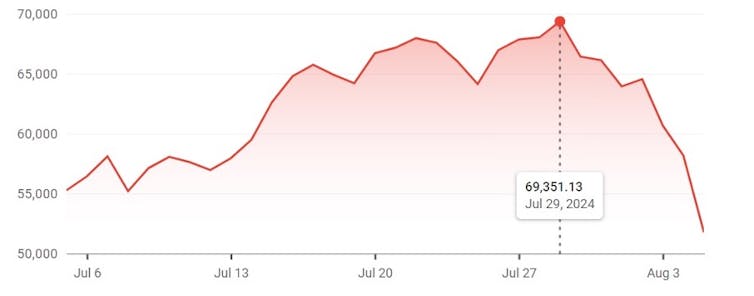Bitcoin, a cryptocurrency infamous for its price volatility and environmental impact, has become a focal point of the US presidential campaign.
On July 27, the former US president and Republican nominee for the upcoming election, Donald Trump, headlined the biggest Bitcoin conference of the year in Nashville. In his speech, Trump claimed he will make the US the “crypto capital of the planet and the Bitcoin superpower of the world” if returned to the White House after November’s election. His comments were met with rapturous applause from the crowd.
Trump’s courting of the crypto industry is almost certainly a political move. The Trump campaign has raised US$25 million (£19.6 million) from the sector since it started accepting cryptocurrency donations in May, and it is expected to receive even more following the event in Nashville.
His public backing of crypto undoubtedly boosted investor optimism. The price of Bitcoin surged to almost US$70,000 on July 29, its highest level in more than six weeks, before dropping back to US$62,000 a few days later.
But questions remain about the feasibility of Trump’s promises if he becomes president. And, even then, it is unclear whether Trump’s pro-crypto agenda will have a sustained effect on the price of Bitcoin in the long term.
Bitcoin’s price surged and fell within a week

Google Finance, CC BY-NC-SA
In his speech, Trump pledged to keep “100% of all the Bitcoin” the US government currently holds or acquires in the future if he is elected.
Many countries, including the US, hold Bitcoin. A large part of these holdings are Bitcoin that has been seized from criminals. The question of how to handle this confiscated cryptocurrency is complex.
Not selling it may send a conflicting message to victims of cryptocurrency crime. Chinese fraud victims, for example, have previously urged the UK government to return £3 billion in Bitcoin held by London police.
If governments truly want to protect consumers from fraud and cybercrime in cryptocurrency markets, recovering stolen Bitcoin should be part of their actions. Thus, Trump’s promise to keep all of America’s Bitcoin holdings may not be practical.
Besides that, Bitcoin was designed initially as a decentralised currency. Its key attraction was that it would operate independently from any central authority.
Since its inception in 2009, the degree of decentralisation has decreased. A large amount of Bitcoin is now held by major mining pools – groups of miners who combine their computational resources to increase their chances of successfully “mining” new Bitcoins.
Adding significant government holdings in Bitcoin could lead to an even greater concentration of power among large players. This is probably not what most cryptocurrency users desire.
The lack of regulatory clarity is another major obstacle to the mass adoption of Bitcoin and other blockchain-based innovations. From this perspective, Trump’s pro-crypto agenda could be welcomed by the crypto community, as he may create a more favourable environment in the US for cryptocurrency miners, startups and other crypto entrepreneurs.
At the Nashville conference, Trump criticised unclear and overly strict US laws, promised to fire the Securities and Exchange Commission (SEC) chair Gary Gensler who is unpopular in crypto circles for his antagonistic stance towards the industry, and warned that the crypto community would be crushed if Kamala Harris is elected.
Trump said: “We will have regulations, but from now on the rules will be written by people who love your industry, not hate your industry.” However, the specifics of how these new “crypto-friendly” regulators will achieve their goals if Trump is elected remain unclear.
In 2023, the SEC led major investigations into crypto’s main troublemakers. The founder of the now bankrupt FTX cryptocurrency exchange, Sam Bankman-Fried, for instance, was sentenced to 25 years in prison for fraud and was ordered to forfeit US$11.2 billion.
The US has the power to make the field safer for all stakeholders. But whether these anti-crime measures will continue under a new crypto-friendly government led by Trump remains uncertain.

Justin Lane / EPA
What drives Bitcoin price volatility?
Regardless of uncertainty about who will take office in November, there are other concerns for cryptocurrency users about government Bitcoin holdings.
Bitcoin’s volatility is in part driven by governments selling their Bitcoin holdings – the price of Bitcoin has fallen by 15% since Germany started selling off approximately €2.5 billion of confiscated Bitcoin at the beginning of June. But Bitcoin is also a highly speculative asset that is extremely sensitive to media coverage, news and even social media announcements.
The stance of the US government on Bitcoin’s environmental issues, which are the subject of much media criticism, would also affect its price in the long term.
Bitcoin mining typically uses vast amounts of computing power to solve various mathematical puzzles and add new tokens to the blockchain. It is a process that consumes an astonishing amount of electricity and water, and produces large quantities of electronic waste.
The US government had launched an initiative in January 2024 aimed at surveying the energy use of mining operations. However, the move was blocked by a federal judge in Texas who said the industry would suffer “irreparable injury” if the new requirements were imposed.
Trump’s promise to support Bitcoin mining in the US may well be received negatively by communities suffering from Bitcoin’s vast resource consumption. In Texas, for example, households are already facing higher electricity costs in areas where Bitcoin is mined on a large scale.
The future of Bitcoin depends on the global political agendas of key countries, including the US. But there are multiple factors driving Bitcoin’s price irrespective of government regulation, so any promises should be interpreted with caution.
For Trump’s pledges to affect Bitcoin’s price in the long term, they must be backed by substantial and consistent measures. Otherwise, they will simply cause temporary price fluctuations like those seen over the past week.




